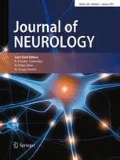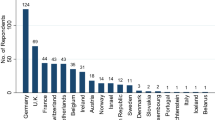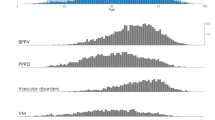Abstract
Purpose
Comprehensive phenotypical data across countries is needed to understand the determinants, prognosis and consequences of vestibular disease. The registry is a data repository for the members of the European DizzyNet. We report results from a pilot study using data from Turkey and Germany.
Methods
The pilot study included a convenience sample of patients aged 18 or above referred to Ege University Medical School Hospital, Dokuz Eylül University Hospital, Izmir, Turkey, and the German Center for German Center for Vertigo and Balance Disorders, University on Munich, Germany, with symptoms of vertigo or dizziness. Health-related quality of life was assessed with the EQ5-D and the Dizziness Handicap Inventory (DHI). To obtain comparable groups we matched data from the two countries for age, sex and diagnosis by propensity score.
Results
We included 80 adult patients, 40 from each country (60% female, mean age 54.1, SD 12.4). Matching was successful. Vestibular migraine (34%) was the most frequent diagnosis, followed by benign paroxysmal positional vertigo (29%) and Menière’s disease (12%). Clinical signs and symptoms were comparable in both countries. Patients from Turkey were more likely to report headaches (65 vs. 32%) and to show gait unsteadiness (51 vs. 5%). Patients from Germany reported significantly higher quality of life and lower values of the DHI score.
Conclusions
Sharing data facilitates research, enhances translation from basic science into clinical applications, and increases transparency. The DizzyNet registry is a first step to data sharing in vestibular research across Europe.
Similar content being viewed by others
References
Rieger A, Mansmann U, Maier W, Seitz L, Brandt T, Strupp M, Bayer O (2013) Management of patients with the cardinal symptom dizziness or vertigo. Gesundheitswesen. https://doi.org/10.1055/s-0033-1357145
Milia N, Congiu A, Anagnostou P, Montinaro F, Capocasa M, Sanna E, Destro Bisol G (2012) Mine, yours, ours? Sharing data on human genetic variation. PLoS One 7(6):e37552. https://doi.org/10.1371/journal.pone.0037552
Peat G, Riley RD, Croft P, Morley KI, Kyzas PA, Moons KG, Perel P, Steyerberg EW, Schroter S, Altman DG, Hemingway H, Group P (2014) Improving the transparency of prognosis research: the role of reporting, data sharing, registration, and protocols. PLoS Med 11(7):e1001671. https://doi.org/10.1371/journal.pmed.1001671
Brandt T, Zwergal A, Jahn K, Strupp M (2009) Integrated center for research and treatment of vertigo, balance and ocular motor disorders. Nervenarzt 80(8):875–876. https://doi.org/10.1007/s00115-009-2812-3
Grill E, Muller T, Becker-Bense S, Gurkov R, Heinen F, Huppert D, Zwergal A, Strobl R (2017) DizzyReg: the prospective patient registry of the German Center for Vertigo and Balance Disorders. J Neurol 264(Suppl 1):34–36. https://doi.org/10.1007/s00415-017-8438-7
Harris PA, Taylor R, Thielke R, Payne J, Gonzalez N, Conde JG (2009) Research electronic data capture (REDCap)—a metadata-driven methodology and workflow process for providing translational research informatics support. J Biomed Inform 42(2):377–381. https://doi.org/10.1016/j.jbi.2008.08.010
Headache Classification Committee of the International Headache S (2013) The international classification of headache disorders, 3rd edition (beta version). Cephalalgia 33(9):629–808. https://doi.org/10.1177/0333102413485658
Lempert T, Olesen J, Furman J, Waterston J, Seemungal B, Carey J, Bisdorff A, Versino M, Evers S, Newman-Toker D (2012) Vestibular migraine: diagnostic criteria. J Vestib Res 22(4):167–172. https://doi.org/10.3233/VES-2012-0453
Staab JP, Eckhardt-Henn A, Horii A, Jacob R, Strupp M, Brandt T, Bronstein A (2017) Diagnostic criteria for persistent postural-perceptual dizziness (PPPD): consensus document of the committee for the Classification of Vestibular Disorders of the Barany Society. J Vestib Res 27(4):191–208. https://doi.org/10.3233/VES-170622
Strupp M, Kim JS, Murofushi T, Straumann D, Jen JC, Rosengren SM, Della Santina CC, Kingma H (2017) Bilateral vestibulopathy: diagnostic criteria consensus document of the Classification Committee of the Barany Society. J Vestib Res 27(4):177–189. https://doi.org/10.3233/VES-170619
Strupp M, Lopez-Escamez JA, Kim JS, Straumann D, Jen JC, Carey J, Bisdorff A, Brandt T (2016) Vestibular paroxysmia: diagnostic criteria. J Vestib Res 26(5–6):409–415. https://doi.org/10.3233/VES-160589
von Brevern M, Bertholon P, Brandt T, Fife T, Imai T, Nuti D, Newman-Toker D (2015) Benign paroxysmal positional vertigo: diagnostic criteria. J Vestib Res 25(3–4):105–117. https://doi.org/10.3233/VES-150553
Greiner W, Weijnen T, Nieuwenhuizen M, Oppe S, Badia X, Busschbach J, Buxton M, Dolan P, Kind P, Krabbe P, Ohinmaa A, Parkin D, Roset M, Sintonen H, Tsuchiya A, de Charro F (2003) A single European currency for EQ-5D health states. Results from a six-country study. Eur J Health Econ 4(3):222–231. https://doi.org/10.1007/s10198-003-0182-5
Jacobson G, Newman C (1990) The development of the dizziness handicap inventory. Arch Otolaryngol Head Neck Surg 116:424–427
Ardic FN, Topuz B, Kara CO (2006) Impact of multiple etiology on dizziness handicap. Otol Neurotol 27(5):676–680. https://doi.org/10.1097/01.mao.0000226292.49789.c9
Kurre A, van Gool CJ, Bastiaenen CH, Gloor-Juzi T, Straumann D, de Bruin ED (2009) Translation, cross-cultural adaptation and reliability of the german version of the dizziness handicap inventory. Otol Neurotol 30(3):359–367. https://doi.org/10.1097/MAO.0b013e3181977e09
Paul Rosenbaum, Donald Rubin (1983) The central role of the propensity score in observational studies for causal effects. Biometrika 70(1):41–55. https://doi.org/10.2307/2335942
Ho D, Imai K, King G, Stuart E (2011) MatchIt: nonparametric preprocessing for parametric causal inference. J Stat Softw 42(8):1–28
RStudio Team (2016) RStudio: integrated development environment for R. Boston, MA
Weidt S, Bruehl AB, Straumann D, Hegemann SC, Krautstrunk G, Rufer M (2014) Health-related quality of life and emotional distress in patients with dizziness: a cross-sectional approach to disentangle their relationship. BMC Health Serv Res 14:317. https://doi.org/10.1186/1472-6963-14-317
Zanotto D, Mamuyac EM, Chambers AR, Nemer JS, Stafford JA, Agrawal SK, Lalwani AK (2017) Dizziness handicap inventory score is highly correlated with markers of gait disturbance. Otol Neurotol 38(10):1490–1499. https://doi.org/10.1097/MAO.0000000000001586
Hsu LC, Hu HH, Wong WJ, Wang SJ, Luk YO, Chern CM (2005) Quality of life in elderly patients with dizziness: analysis of the Short-Form Health Survey in 197 patients. Acta Otolaryngol 125(1):55–59
Aggarwal NT, Bennett DA, Bienias JL, Mendes de Leon CF, Morris MC, Evans DA (2000) The prevalence of dizziness and its association with functional disability in a biracial community population. J Gerontol A Biol Sci Med Sci 55(5):M288–M292
Tinetti ME, Williams CS, Gill TM (2000) Health, functional, and psychological outcomes among older persons with chronic dizziness. J Am Geriatr Soc 48(4):417–421
Penger M, Strobl R, Grill E (2017) Country-specific and individual determinants of dizziness in Europe: results from the Survey of Health Ageing and Retirement in Europe (SHARE). Public Health 149:1–10. https://doi.org/10.1016/j.puhe.2017.04.002
Wallis JC, Rolando E, Borgman CL (2013) If we share data, will anyone use them? Data sharing and reuse in the long tail of science and technology. PLoS One 8(7):e67332. https://doi.org/10.1371/journal.pone.0067332
Federer LM, Lu YL, Joubert DJ, Welsh J, Brandys B (2015) Biomedical data sharing and reuse: attitudes and practices of clinical and scientific research staff. PLoS One 10(6):e0129506. https://doi.org/10.1371/journal.pone.0129506
Haeusermann T, Greshake B, Blasimme A, Irdam D, Richards M, Vayena E (2017) Open sharing of genomic data: who does it and why? PLoS One 12(5):e0177158. https://doi.org/10.1371/journal.pone.0177158
Gabriels K, Moerenhout T (2018) exploring entertainment medicine and professionalization of self-care: interview study among doctors on the potential effects of digital self-tracking. J Med Internet Res 20(1):e10. https://doi.org/10.2196/jmir.8040
Funding
This work was supported by funds from the German Federal Ministry of Education and Research under the grant code 01EO1401 as part of the European DizzyNet. The authors bear full responsibility for the content of this publication.
Author information
Authors and Affiliations
Corresponding author
Ethics declarations
Conflicts of interest
On behalf of all authors, the corresponding author states that there is no conflict of interest.
Ethical standards
All human and animal studies have been approved by the appropriate ethics committee and have, therefore, been performed in accordance with the ethical standards laid down in the 1964 Declaration of Helsinki and its later amendments. We thank Amanda Phillips for copy-editing of the final manuscript.
Additional information
This manuscript is part of a supplement sponsored by the German Federal Ministry of Education and Research within the funding initiative for integrated research and treatment centers.
Rights and permissions
About this article
Cite this article
Grill, E., Akdal, G., Becker-Bense, S. et al. Multicenter data banking in management of dizzy patients: first results from the DizzyNet registry project. J Neurol 265 (Suppl 1), 3–8 (2018). https://doi.org/10.1007/s00415-018-8864-1
Received:
Revised:
Accepted:
Published:
Issue Date:
DOI: https://doi.org/10.1007/s00415-018-8864-1




